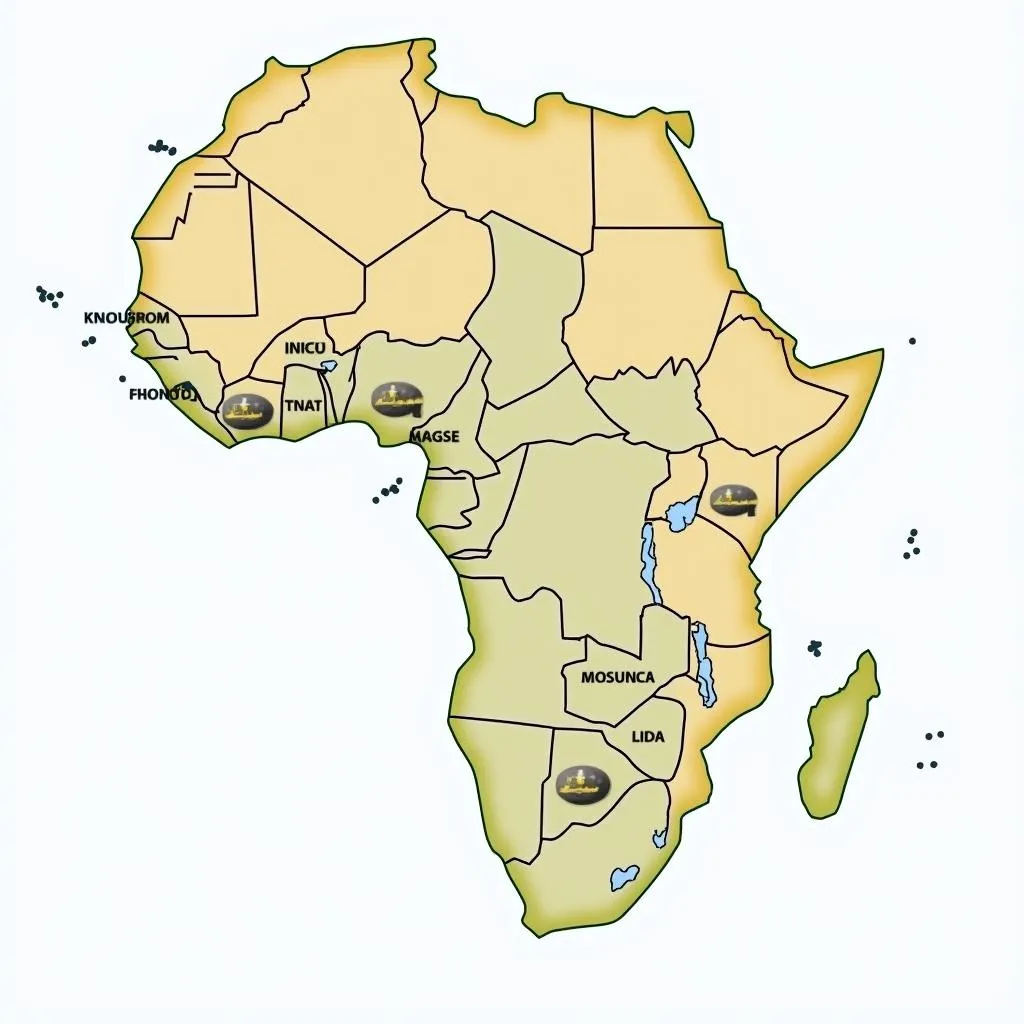Navigating the African Currency Market
The African Currency Market is a dynamic and multifaceted landscape, reflecting the continent’s diverse economies and evolving financial systems. Understanding the factors influencing African currencies is crucial for investors, businesses, and individuals alike.
Factors Influencing African Currency Fluctuations
Several key elements contribute to the volatility and trends observed in the African currency market:
- Commodity Prices: Many African economies rely heavily on exporting raw materials such as oil, gold, and minerals. Fluctuations in global commodity prices directly impact currency values. For example, a surge in african gold prices today could strengthen the currency of a gold-exporting nation.
- Global Economic Conditions: Economic slowdowns in major economies like the US, China, or the Eurozone can reduce demand for African exports, negatively impacting currency values.
- Political Stability and Governance: Political instability, elections, and policy changes can introduce uncertainty, leading to currency depreciation. Strong governance and stable political environments tend to attract foreign investment, bolstering currency strength.
The Role of Central Banks
Central banks across Africa play a crucial role in managing their respective currencies. They employ various monetary policies to:
- Control Inflation: Central banks adjust interest rates and money supply to manage inflation and stabilize prices within their economies.
- Manage Exchange Rates: Interventions in the foreign exchange market, such as buying or selling their own currency, can influence its value relative to others.
- Promote Economic Growth: By influencing interest rates and the availability of credit, central banks can stimulate economic activity and promote investment.
Opportunities and Challenges in the African Currency Market
The African currency market presents both opportunities and challenges:
Opportunities:
- Growth Potential: Many African economies are experiencing significant growth, leading to increased investment opportunities and potential currency appreciation.
- Diversification: Investing in a basket of African currencies can offer diversification benefits, mitigating risks associated with individual countries.
Challenges:
- Volatility: The susceptibility to commodity price swings and political events can make African currencies more volatile than those of developed economies.
- Liquidity: Some African currency markets may have lower trading volumes, potentially leading to wider bid-ask spreads and making it more challenging to execute large trades.
 African Central Bank Monetary Policy Meeting
African Central Bank Monetary Policy Meeting
Key African Currencies
While the continent boasts a diverse range of currencies, some of the most traded and influential include:
- South African Rand (ZAR): As a major commodity exporter and a sophisticated financial hub, South Africa’s Rand is one of the most liquid and traded African currencies. You can find more information about financial institutions in South Africa, such as the african bank pretoria, online.
- Nigerian Naira (NGN): Nigeria, with its vast oil reserves and large population, commands a significant presence in the African currency market.
- Kenyan Shilling (KES): Kenya’s position as an East African economic powerhouse and its growing tourism industry contribute to the significance of the Kenyan Shilling.
The Future of the African Currency Market
The African Continental Free Trade Area (AfCFTA) agreement holds the potential to reshape the African currency market significantly. By promoting intra-African trade and reducing barriers, AfCFTA could lead to:
- Increased Currency Stability: Enhanced trade within the continent could lessen reliance on external markets, potentially reducing currency volatility.
- Emergence of a Pan-African Currency: Discussions surrounding a potential single currency for Africa, similar to the Euro, could gain momentum with the implementation of AfCFTA.
“The introduction of a pan-African currency, if implemented effectively, could streamline transactions, reduce exchange rate risks, and foster greater economic integration across the continent,” says Dr. Abena Asare, a leading economist specializing in African financial markets.
Conclusion
The African currency market, while presenting certain risks, offers substantial potential for investors and businesses. Understanding the factors driving currency movements, the role of central banks, and the potential impact of initiatives like AfCFTA is crucial for navigating this dynamic landscape. Staying informed and conducting thorough research is essential for making informed decisions in this evolving market.
FAQs about the African Currency Market
1. Which African currency is the strongest?
Currency strength is relative and constantly fluctuating. Several factors, such as economic performance, interest rates, and political stability, determine a currency’s value. It’s best to consult up-to-date financial information.
2. What is the impact of the African Continental Free Trade Area (AfCFTA) on currencies?
AfCFTA aims to boost intra-African trade, which could lead to increased currency stability and potentially pave the way for a pan-African currency in the future.
3. Are there any risks associated with investing in African currencies?
As with any investment, there are inherent risks. African currencies can be volatile due to their dependence on commodity prices and political events.
4. Where can I find reliable information on African currency exchange rates?
Reputable financial websites, banks, and currency exchange platforms provide up-to-date information on exchange rates.
5. What is the role of mobile money in the African currency market?
Mobile money platforms have revolutionized financial transactions in Africa. While they don’t directly impact currency values, their widespread adoption highlights the continent’s innovative approach to financial inclusion.
 African Entrepreneur Reviewing Currency Data
African Entrepreneur Reviewing Currency Data
For further insights into specific African countries and their unique currency landscapes, explore our articles on african countries seychelles and the fascinating world of african continent currency. If you’re interested in exploring the relationship between African currencies and precious metals, you can find detailed information on the african gold rate in rupees.
Our website offers a wealth of information on various aspects of Africa, including culture, travel, and business. Feel free to browse our diverse content for a deeper understanding of this vibrant continent.
For any inquiries or assistance, please don’t hesitate to reach out to our dedicated customer support team available 24/7. You can contact us at +255768904061, kaka.mag@gmail.com, or visit our office located at Mbarali DC Mawindi, Kangaga, Tanzania.

